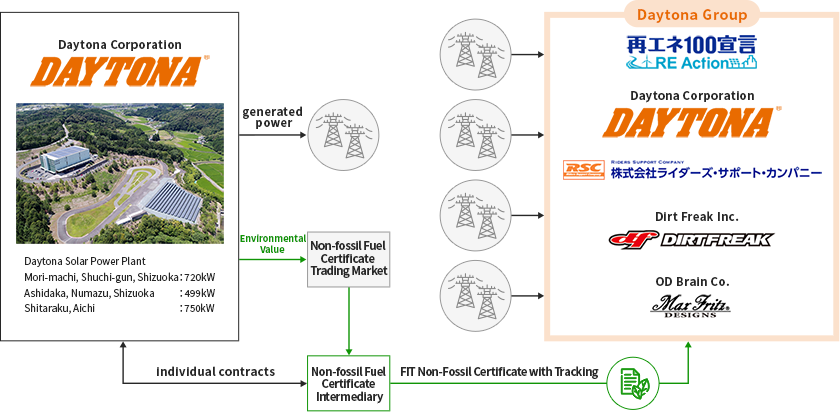Our non-fossil fuel certificates with solar power generation tracking realize decarbonization of the Group's electricity consumption

Through our partnership with non-fossil fuel certificate intermediaries specializing in Climate Change Technology, which was established in November 2021, we have made significant strides toward achieving the goals outlined in the "RE Action of the 100 Renewable Energy Declaration." While the Daytona Group purchases renewable energy electricity from U-POWER, constituting 10% of our total energy usage, the remaining 90% of our electricity procurement does not inherently possess environmental value. We have successfully addressed this by obtaining FIT non-fossil certificates, which meticulously track the electricity generated by our Daytona solar power plant through e-dash. This commitment to renewable energy and certificate acquisition has effectively decarbonized our electricity consumption across the Daytona Group, contributing to a more sustainable and environmentally friendly approach to power generation.
Efforts to develop hydrogen generators
To advance the development of alternative energy sources to decarbonized energy and fossil fuels, we are actively engaged in research initiatives. Our focus centers on on-demand hydrogen generators utilizing sodium borohydride (SBH) and emergency engine generators powered by on-demand hydrogen generation. These projects are being conducted in collaboration with universities and are aimed at determining their practical viability by the end of the fiscal year 2022. With the intention of making these technologies available to the market, we had initially set a target of commercialization by 2024; however, due to evolving market dynamics, we have temporarily postponed these plans.

In addition, we are conducting research on recycling by-products from hydrogen generators to recycle them as SBH
A patent was registered for an engine generator that generates hydrogen gas on April 16, 2021.
| subject |
hydrogen gas generator, internal combustion engine to which it is applied, and generator driven by ⇒ internal combustion engine |
| Patent number |
No. 6869799 |
| Date of registration |
April 16, 2021 |
Recycling of waste
Targets
We will promote the recycling of waste from our business and aim to achieve zero CO2 emissions by 2030.
- We will thoroughly separate combustible waste from resources.
- We will promote the reduction of copy paper used in business and the shift to paperless.
- We will promote the recycling of plastic waste.
In terms of CO2 emissions from garbage that cannot be improved in our internal initiatives, we will consider virtually zero carbon through carbon offsetting.
Results
Towards Zero CO2 Emissions from Fossil Fuels
Targets
We aim to achieve zero CO2 emissions from fossil fuels used in our business by 2030.
- We will actively promote the switch of company vehicles to fuel-efficient vehicles (HVs).
- We will consider switching some of our company vehicles to electric vehicles (EVs).
- In the future, we will consider switching to alternative fuels that have environmental value.
*For fossil fuels that cannot be improved, we will consider virtually zero carbon through carbon offsetting.
Results